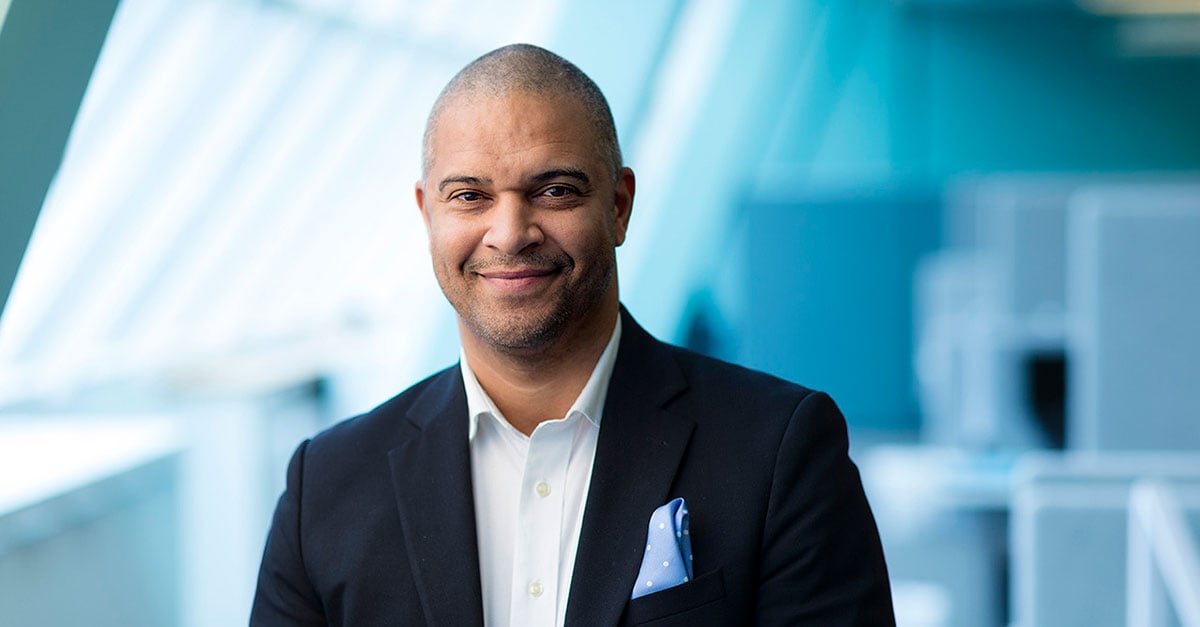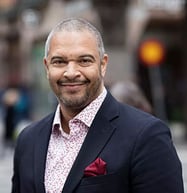
An interview with Bengt Johansson, CEO of Forsen.
Seven years ago, Bengt Johansson took the reins as CEO of Forsen, one of the leading project- and construction companies in Sweden. In that time, not only has the company grown, but its focus on people and HR has come into sharp focus. In this interview, Bengt shares his thoughts about HR and why he is so certain that this department will become the most important support function in the future.
What do you think makes a strong leader?
My belief is that emotional intelligence – or EQ – is one of the most important traits a leader can possess. Back in the day, people in highly operational positions who succeeded in their roles would be promoted to leadership positions. However, being intelligent and highly skilled in your profession doesn’t necessarily mean you’ll be a good leader.
Most often, the skills needed for great leadership differ substantially from the skills needed to solve technical other kinds of challenges that don’t involve people to such an extent. Having high EQ is crucial for leaders as it involves the ability to sense how people are feeling and reacting to their surroundings, their tasks and workload, their responsibilities, and what’s being communicated. Employees need to feel heard and appreciated, while also knowing what they are trying to achieve, their career goals, their work-life balance, and so on.
"The skills needed for great leadership differ substantially from the skills needed to solve technical other kinds of challenges."
How do you approach this as CEO of Forsen?
For managers, it’s very common to focus on the equation Revenue - Cost = Result. For me, it's equally important to care about the people, since they are the ones to create the revenue and the results.
Everything starts with happy employees. People rarely quit their jobs because they’re dissatisfied with their tasks; the quit because they’re dissatisfied with their manager, and because they feel their aspirations and career goals aren’t being cared for. But when your employees are feeling well, heard, and motivated, the desired results will follow. In fact, your employees will be willing to walk the extra mile for your customers and partners, which will have great impact on the company’s bottom line result.
"A good leader is not afraid to make decisions, but neither is he or she afraid to admit when those decisions turn out to be wrong."
I’m not claiming to be the perfect leader, but I try to stay conscious of my flaws and I’m constantly working on improving myself. A good leader is not afraid to make decisions, but neither is he or she afraid to admit when those decisions turn out to be wrong. That’s why teamwork is so important; you have to surround yourself with different types of people and talents, and then listen to them.
How has Forsen’s culture changed since you became CEO?
I love people; I love interacting with people; I love learning from people. I believe this comes through authentically in everything I do.
When I started at Forsen, there was no HR department. However, the owners have a very good understanding of and interest in people, and that’s partly what made me interested in this company. Their values were aligned with mine.
The culture has changed as we have grown, and our focus on people has become even stronger over the years. I believe there are three main factors that indicate whether I’m doing a good job or not:
- Dedication & Goals: making sure I take the organisation in the right direction to meet our goals.
- Great Place to Work: Are my employees satisfied with their work environment, their wages, and their managers? The answer can’t come from me, nor the management team. We have qualified for Great Place to Work for five years in a row, and that verdict comes from the employees. It proofs we’re doing the right things.
- Returning employees: As CEO of Forsen, I am always so proud when former employees and skilful talents come knocking on my office door and say they want to come back to the organisation. That also shows that we’re doing a good job of taking care of our employees.
In what way do you rely on HR to provide you with valuable information, figures, KPI’s etc?
Investing in proper digital tools for HR was one of the best and most valuable initiatives we could take. We use employee data and analytics retrieved from our HR system in our board meetings, management meetings, and we use this crucial information for decision-making and strategy planning. It shouldn’t come as a surprise to anyone that there is a lot of time to be saved by having all this kind of information in one single system.
"Investing in proper digital tools for HR was one of the best and most valuable initiatives we could take."
This is part of why I have such a great confidence and trust in our HR department; they made sure to invest in the proper tools to enable this useful data whenever needed. Without it, we would only be able to guess at how our organisation is doing and what potential challenges we are about to face. People data enables us to work proactively instead of reactively, which I am pretty sure gives us a competitive advantage.
The HR function back in the day was not as highly prioritised or valued as I think it is these days. That’s because they couldn’t provide the same value to the core business. Today, however, HR is my best friend! For this reason, HR is an unquestioned member of my management team, and they are highly involved in creation of the business plan.
"As a CEO, I’m all about the business, and there is no business without people. Simply put, HR IS Business!"
HR will probably become the most important support function in the future. Why? Because they sit with hands on information about the recruitment market, with trends, risks, and they are the ones collecting data about people performance with regards to goals and KPIs. To me, in my role, my biggest concern is that we can deliver what our customers are expecting from us, and we can only continue doing this if we have a well-functioning organisation with people who likes their job and managers. Knowing the fact that HR have the skills and tools to manage this is of course valuable to me.
What advice would you give to other organisations where HR doesn’t have a seat at the table?
I’d tell them to read the latest research and studies that show the increasing value of HR matters for the modern business. As a CEO, I’m all about the business, and there is no business without people. Simply put, HR IS Business!
HR will become as important a support function as Finance has been for the past twenty years, if not more so. No matter the kind of company or industry you’re operating in, how to attract, recruit, onboard, reward, engage, motivate, develop, retain and offboard your employees will be critical to business success.
There are very few CEOs with extensive knowledge of HR. Therefore, HR must be able to show to the rest of the organisation how important human capital is. And if they can’t provide clear understanding of their value, the reason might be partly due to lack of proper tools, in which case HR must build a business case to make sure they get support to invest in digitalisation. After all, modern HR systems are beneficial to the entire organisation, especially the IT department. We achieve control on critical personal data through our HR system since that’s where our master data is.
"As the collective voice of employees, HR has the power to achieve real impact in an organisation."
As the collective voice of employees, HR has the power to achieve real impact in an organisation. You need to know the status on the ground to make the right decisions and set realistic objectives. I believe this is where many organisations fail. The board ends up disconnected from the organisation, which in the worst-case scenario leads to a false picture of the organisation.
What would you like to see more of from HR in the future?
Although we encourage HR to work strategically and systematically to provide us with accurate figures and facts, I wouldn’t want to see HR losing its core focus: namely, putting people first. If the CEO, Finance, Sales, and IT are focused on systems and revenue, someone must be trusted to focus on the other critical part: those who are to deliver the results, the people.
What are your final tips for other CEOs?
Dare to experiment. There is very little to lose, if anything, and a lot to gain from letting HR become more involved in strategic planning. Give them room (and the budget!) to invest in the right digital tools. There is an increasing number of reports, seminars and studies of HR’s role in the modern organisation, and I encourage CEOs to take a look at these to build their own understanding and expectations.
"There’s a lot to gain from letting HR become more
involved in strategic planning."
Take a look at the companies that have been very successful in their people management and culture development and use them as a benchmark. I also find Great Place to Work to be a good tool for benchmarking when it comes to how well you’re taking care of your organisation. I am of course proud to find our own company on the list of Great Places to Work for the 5th year in a row and we have no intention other than to remain on top of this list as we continue to grow.
About Bengt Johansson
 Bengt Johansson has been the CEO of Forsen since 2012. During this time, he has led the company through strong organic growth while retaining profits. In addition to his entrepreneurial and business-analytical skill set, Bengt has a strong commitment to people and culture. Forsen is value-driven with great focus on communication, development and transparency where all managers are operationally involved in the organisation’s projects.
Bengt Johansson has been the CEO of Forsen since 2012. During this time, he has led the company through strong organic growth while retaining profits. In addition to his entrepreneurial and business-analytical skill set, Bengt has a strong commitment to people and culture. Forsen is value-driven with great focus on communication, development and transparency where all managers are operationally involved in the organisation’s projects.
Connect with Bengt Johansson on LinkedIn here
About Forsen
Forsen is a Swedish company that specialises in qualified project and construction management, primarily in building, construction and housing with commercial and public property owners as its main customers. Forsen’s 200 employees are experts in the construction process at all stages.
Read more about Forsen here


